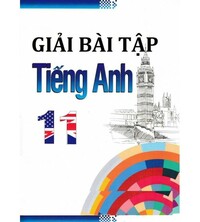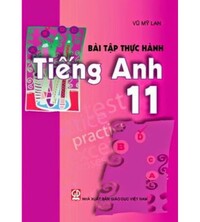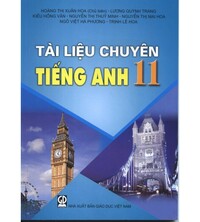Bộ đề thi giữa học kì 2 môn Anh lớp 11 có đáp án
Bộ đề kiểm tra Tiếng Anh lớp 11 giữa kì 2 nằm trong bộ đề ôn thi giữa học kì 2 lớp 11 năm học 2022 - 2023 do Tìm Đáp Án sưu tầm và đăng tải. Bộ đề thi Tiếng Anh gồm 10 đề kiểm tra Tiếng Anh 11 khác nhau với nội dung bám sát chương trình học 8 tuần đầu học kì 2 giúp học sinh lớp 11 củng cố kiến thức đã học hiệu quả và đạt điểm cao trong kì thi sắp tới.
Đề kiểm tra tiếng Anh lớp 11 giữa học kì 2 có đáp án
Đề giữa học kì 2 lớp 11 môn tiếng Anh số 1
I. Choose the word whose underlined part is pronounced differently from that of the others. (1p)
1. A. decreased B. endangered C. established D. influenced
2. A. rugby B. cycling C. nearby D. apply
3. A. nature B. spacious C. Asian D. squash
4. A. with B. tooth C. both D. tenth
|
1. B |
2. A |
3. D |
4. A |
II. Choose the best options (2p)
5. ____________ from several countries competed in many Asian Games.
A. Spectators B. Audience C. Athletes D. Viewers
6. Nellie Ross of Wyoming was the first woman ________ as the governor in the United State.
A. who elected B. to be elected C. was elected D. her election as
7. Non-renewable energy sources are running __________
A. out B. to C. on D. up
8. Many animals are ______ for their fur and other valuable parts of their bodies.
A. followed B. chased C. run after D. hunted
9. We are proud of our ______ staff, who are always friendly and efficient.
A. well-done B. well-appointed C. well-trained D. well-behaved
10. Do you still remember the day ________ you sent that letter?
A. on which B. why C. where D. on when
11. The house ________ in the storm has now been rebuilt.
A. destroyed B. destroying C. which destroyed D. that is destroyed
12. Jane has two brothers, ___________ famous footballers.
A. both of who B. both of whom C. of who both D. of whom both
|
1. B |
2. B |
3. A |
4. D |
|
5. C |
6. A |
7. D |
8. B |
III. Complete each sentences with the correct form of the word in bracket. (0.5p)
1. For all animals in the wild, every day is a fight for (survive) …………………………
2. Did Pamela get the (promote) ……………………that she wanted?
1. For all animals in the wild, every day is a fight for (survive) ……………survival……………
2. Did Pamela get the (promote) …………promotion…………that she wanted?
IV. Choose the underlined part in each sentence that should be correct. (0.5p)
1. The number of (A) rare animals is decreasing (B) so rapid (C) that they are in danger (D) of extinction.
2. The leader of the team (A) apologized for (B) not be able (C) to win (D) the competition.
V. Fill in the space of the following sentences with a correct relative pronoun. (1p)
1. The people __________ we visited yesterday were very nice.
2. The Post Office ___________ my aunt is working is very large.
3. Mrs. Mai, ___________ house is opposite the post office, is our teacher.
4. Thirty people, three ______________ were the members of the crew, were killed in the plane crash.
1. The people ____whom______ we visited yesterday were very nice.
2. The Post Office ____where_______ my aunt is working is very large.
3. Mrs. Mai, ____whose_______ house is opposite the post office, is our teacher.
4. Thirty people, three ______who________ were the members of the crew, were killed in the plane crash.
VI. Rewrite the sentences with the same meaning using the clues (2p)
1. Be sure to follow the instructions that are given at the top of the page. (adjective phrase)
=> ……………………………………………………………………………………..
2. Nam was the third person who got mark 10 in math. (adjective phrase)
=> ………. ..…………………………………………………………………………..
3. He’s the criminal. The police are looking for him. (preposition + whom/which)
=> …………………..…………………………………………………………………..
4. The small man was Lisa’s husband. Nobody recognized him. (relative pronoun)
=> …………………………………. …………………………………………………..
1. Be sure follow the instructions given at the top of the page.
2. Nam was the third person to get mark 10 in math
3. He’s the criminal for whom the police are looking
4. The small man whom nobody recognized was Lisa’s husband
VII. Read the passage and choose the best option to answer the question (2p)
One of the most urgent environmental problems in the world today is the shortage of clean water. Having clean drinking water is a basic human right. But acid rain, industrial pollution and garbage have made many sources of water undrinkable. Lakes, reservoirs and even entire seas have become vast pools of poison. Lake Baikal in Russia is one of the largest lakes in the world. It contains a rich variety of animals and plants, including 1,300 rare species that do not exist anywhere else in the world. But they are being destroyed by the massive volumes of industrial wastes which pour into the lake every day. Even where law existed, the government did not have the power to enforce them. Most industries simply ignore the regulations. The Mediterranean Sea occupies 1% of the world’s water surface. But it is the dumping ground for 50% of all marine pollution. Almost 16 countries regularly throw industrial wastes a few miles off shore.
Water is free to everyone. A few years ago people thought that the supply of clean water in the world was limitless. Today, many water supplies have been ruined by pollution and sewage. Clean water is now scarce, and we are at last beginning to respect this precious source. We should do something now.
1. One environmental problem in the world today is --------------.
A. acid rain B. safe water shortage C. industrial pollution D. population explosion
2. What is a serious problem of Lake Baikal in Russia?
A. It contains a rich variety of animals and plants.
B. It has 1,300 rare species that do not exist anywhere else in the world.
C. It is polluted by massive volumes of industrial wastes discharged into it.
D. The government did not have the power to enforce laws and regulations.
3. How many countries throw industrial wastes into the Mediterranean Sea regularly?
A. exactly 16 B. exactly 15 C. less than 15 D. nearly 16
4. What is the message to the readers?
A. We should take action to protect our water resources.
B. We should take all water resources into account
C. We should limit the use of water resources.
D. We should encourage people to use safe water
|
1. B |
2. C |
3. D |
4. A |
VIII. Write a short paragraph about the reasons why nature in danger and its solutions. (at least 60 words) (1p)
Đề thi Tiếng Anh 11 giữa kì 2 số 2
I. Phonetics: (1p)
Choose one word whose underlined part is pronounced differently
|
1. A. dinner |
B. disappear |
C. discover |
D. dinosaur |
|
2. A. annual |
B. basic |
C. average |
D. capacity |
Choose the letter A, B, C, or D to indicate the word that differs from the other three in the position of primary stress in each of the following questions.
|
3. A. broaden |
B. provide |
C. pursue |
D. succeed |
|
4. A. analytical |
B. opportunity |
C. qualification |
D. university |
II. Vocabulary and Grammar
Use the word given in capitals at the end of each line to form the word that fits in the gap in the same line. (1p)
1. Every one of us can help to protect and sustain our environment by _________ our consumption habits. (CHANGE)
2. There is a _______ between the recent droughts and climate change. (CONNECT)
3. The ________ of the earth's atmosphere causes sea-level rise. (WARM)
4. Most of these students are interested in pursuing _____________ studies for bachelor's degrees. (GRADUATE)
Give the correct form of the verbs in brackets (1.5p)
1. So far the college authorites (try) ___________ to make the application process as simple and fast as possible for international students.
2. Since 2000, the Ministry of Education and Training (attempt) ___________ to prevent classroom overcrowding with a plan to establish a further number of over 40 unversities in Vietnam.
3. Vietnam’s higher education (grow) ____has grown_______ quickly over the last 15 years.
4. The tertiary enrolment (increase) ____has increased_______ rapidly over the last 20 years.
5. Since 1995, higher education cooperation (be) _____has been______ a cornerstone of the US-Vietnam relationship.
Choose the best answer A, B, C or D to complete the sentences. (1.5 p)
1. Thank you for having ____ the information about global warming.
A. shared B. sharing C. share D. shares
2. These students were rewarded ____ actively taken part in voluntary activities.
A. with B. before C. on having D. for having
3. Depending on your nationality, you may be ____ for a loan or financial support from the UK government.
A. keen B. eligible C. legal D. capable
4. University ____ in Vietnam can decide their own criteria for enrolling international students.
A. bosses B. leaders C. principals D. rectors
5. The low ____ in the Mekong Delta leads to acute saline instruction much deeper than the traditional 30 to 40 km of mainland that is contaminated with saltwater.
A. water level B. salt water C. water currents D. sea level
III. Writing. (2.5p)
Rewrite the following sentences using the words in the brackets
1. Having been told about the dangers of chemical fertilisers, they turned to bio - fertilisers. (Because)
_______________________________________________________
2. Having finished all my homework, I watched my favourite film on TV. (After)
_______________________________________________________
3. Having managed water resources irresponsibly, the authorities had to deal with water shortages in the region. (Since)
_______________________________________________________
4. Mary is staying at a homestay during her undergraduate programme. The programme began three weeks ago. (for)
_______________________________________________________
5. They visited this college in 2009, 2012 and 2014. (three times)
_______________________________________________________
IV. Reading: (2.5p)
Read a text and choose the correct answer
The system of higher education had its origin in Europe in the Middle Ages, when the first universities were established. In modern times, the nature of higher education around the world, to some extent, has been determined by the models of influential countries such as France and Germany.
Both France and Germany have systems of higher education that are basically administered by state agencies. Entrance requirements for students are also similar in both countries. In France, an examination called the baccalauréat is given at the end of secondary education. Higher education in France is free and open to all students who have passed this baccalauréat. Success in this examination allows students to continue their higher education for another three or four years until they have attained the first university degree called a licence in France.
Basic differences, however, distinguish these two countries' systems. French educational districts, called académies, are under the direction of a rector, an appointee of the national government who is also in charge of universities in each district. The uniformity in curriculum throughout the country leaves each university with little to distinguish itself. Hence, many students prefer to go to Paris, where there are better accommodations and more cultural amenities for them. Another difference is the existence in France of prestigious higher educational institutions known as grandes écoles, which provide advanced professional and technical training. Most of these schools are not affiliated with the universities, although they too recruit their students by giving competitive examinations to candidates. The grandes écoles provide rigorous training in all branches of applied science and technology, and their diplomas have a somewhat higher standing than the ordinary licence.
In Germany, the regional universities have autonomy in determining their curriculum under the direction of rectors elected from within. Students in Germany change universities according to their interests and the strengths of each university. In fact, it is a custom for students to attend two, three, or even four different universities in the course of their undergraduate studies, and the majority of professors at a particular university may have taught in four or five others. This high degree mobility means that schemes of study and examination are marked by a freedom and individuality unknown in France.
France and Germany have greatly influenced higher education systems 20cd the world. The French, either through colonial influence or the work of missionaries, introduced many aspects of their system in other countries. The German the first to stress the importance of universities as research facilities, and they also created a sense of them as emblems of a national mind.
Question 1. What does the passage mainly discuss?
A. The nature of education around the world in modern times
B. Systems of higher education in France and Germany
C. The origin of higher education system in Europe
D. The influence of France and Germany on educational systems of other countries
Question 2. The word “uniformity” in paragraph 3 is closest in meaning to ____.
A. proximity B. discrepancy C. similarity D. uniqueness
Question 3. The word "their" in paragraph 3 refers to ____.
A. schools B. universities C. examinations D. branches
Question 4. Which of the following about grandes écoles in France is NOT stated in paragraph 3?
A. Most of them have no connection with universities.
B. They have a reputation for advanced professional and technical training.
C. Their degrees are better recognized than those provided by universities.
D. They offer better accommodations and facilities than universities.
Question 5. According to the passage, a regional university rector in Germany is elected by ____.
A. the staff of the university B. the national government officials
C. the regional government officials D. the staff of other universities
Question 6. According to paragraph 4, what makes it possible for students in Germany to attend different universities during their undergraduate studies?
A. The university staff have become far more mobile and occupied.
B. The university's training programs offer greater flexibility and freedom of choice.
C. University tuition fees are kept at an affordable level for all students.
D. Entry requirements to universities in Germany are made less demanding.
Question 7. The word “emblems” in the final paragraph is closest in meaning to
A. representatives B. directions C. structures D. delegates
Question 8. Which of the following can be inferred from the passage?
A. Studying in France and Germany is a good choice for people of all ages and nationalities.
B. It normally takes longer to complete a university course in France than in Germany.
C. Universities in Germany can govern themselves more effectively than those in France.
D. The level of decentralization of higher education is greater in Germany than in France.
Xem đáp án chi tiết tại: Đề thi Tiếng Anh lớp 11 giữa kì 2 năm 2023
8 đề thi giữa kì 2 tiếng Anh 11
Tải file để xem chi tiết
Mời bạn đọc tải trọn bộ nội dung bộ đề tại đây: Bộ đề thi giữa học kì 2 lớp 11 môn Tiếng Anh năm học 2020 - 2021. Ngoài ra, Tìm Đáp Án đã đăng tải rất nhiều tài liệu ôn tập Tiếng Anh lớp 11 cả năm khác như: Để học tốt Tiếng Anh lớp 11, Bài tập Tiếng Anh lớp 11 theo từng Unit trực tuyến, Đề thi học kì 1 lớp 11, Đề thi học kì 2 lớp 11,.. Mời thầy cô, quý phụ huynh và các em học sinh tham khảo, download phục vụ việc học tập và giảng dạy.







